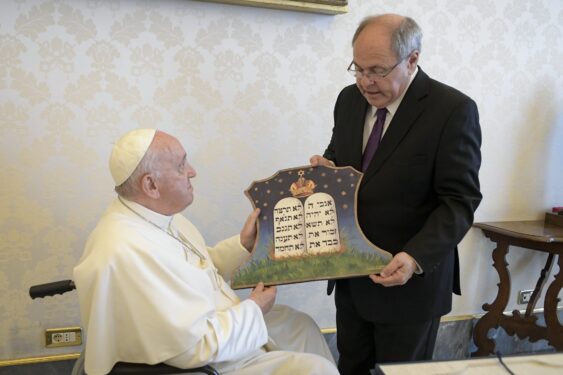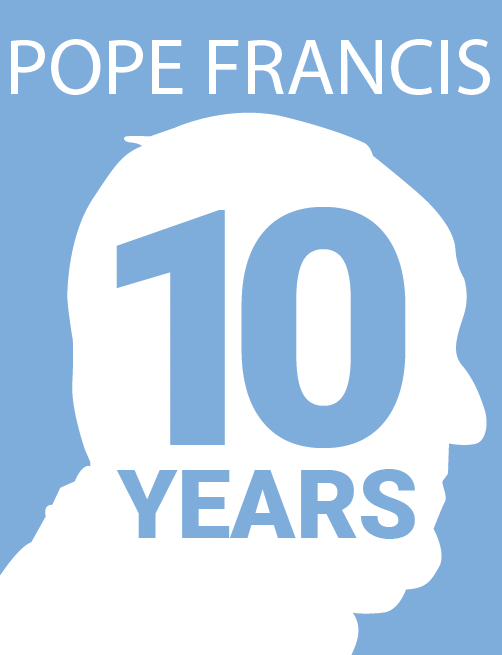
By Gina Christian

“This papacy has jumped us forward,” said Rebecca Cohen, a program and research specialist for the U.S. Conference of Catholic Bishops’ Secretariat for Ecumenical and Interreligious Affairs.
Pope Francis had a decided edge, having “(come) to the papacy with the greatest experience of interreligious dialogue with rabbis of any of his papal predecessors,” said Philip Cunningham, co-director of the Institute for Jewish-Catholic Relations (IJCR) at Saint Joseph’s University in Philadelphia.
A number of those interviewed by OSV News pointed to Pope Francis’ enduring relationships with Jewish leaders — including Rabbi Abraham Skorka and Rabbi Sergio Bergman, both of whom knew and worked with the former Cardinal Jorge Bergoglio in Argentina — as essential to his ability to advance Jewish-Catholic interactions.
“His personal relationships with Jewish leaders such as Rabbis Abraham Skorka and Sergio Bergman predate his election and show that this is something deeply personal for the pope,” Rabbi David Fox Sandmel, chair of the International Jewish Committee for Interreligious Consultations, told OSV News.
“When Pope Francis reflects on any Jewish matter, along with his knowledge, undoubtedly the affections forged with his Jewish friends appear in his mind and heart,” Rabbi Skorka told OSV News.
Back in Buenos Aires, then-Cardinal Bergoglio “had already adopted” an attitude that sought a “deepening of mutual understanding” and “the creation of a dialogue in the deepest sense of the concept,” said the rabbi.
The two recorded 31 television dialogues in Argentina and co-authored the book “On Heaven and Earth,” which “testified to the development of a dialogue without restrictions or limitations of any kind … (building) a relationship that knows how to lead to affection,” said Rabbi Skorka, now a senior research fellow for Jewish Studies and Jewish-Christian Relations at Georgetown University.
In 2014, Pope Francis traveled to Israel, Jordan and Palestine with both Rabbi Skorka and Sheik Omar Abboud, co-president of the Institute for Interreligious Dialogue (IDI) in Buenos Aires and a former secretary-general of the Islamic Center of Argentina.
Key moments in Pope Francis’ relations with the Jewish community have included a 2016 visit to the Great Synagogue of Rome and the 2020 opening of the Vatican’s archives on the pontificate of Pope Pius XII, whose papacy spanned the Second World War, during which 6 million European Jews were systematically murdered by Nazi Germany in the Shoah (the preferred Hebrew term for the Holocaust).
Over the past decade, Pope Francis has routinely met with Jewish leaders and organizations, including the World Jewish Congress in November 2022. In 2017, he welcomed a delegation of European, American and Israeli rabbis, who presented “Between Jerusalem and Rome,” the official Jewish response to the Second Vatican Council’s “Nostra Aetate,” the church’s landmark document on interreligious relations.
The pope has offered multiple messages and addresses to the Jewish community, and “it is during his papacy that the important document ‘The Gifts and Calling of God are Irrevocable’ was issued by the Commission for Religious Relations with the Jews, which spelled out the church’s evolving understanding of its relationship with the Jewish people,” said Rabbi Sandmel.
Pope Francis’ 2013 apostolic exhortation “Evangelii Gaudium” (“The Joy of the Gospel”) has been a crucial contribution to the issue, said those interviewed by OSV News.
“One of the most important things he wrote in ‘Evangelii Gaudium,’ and which was a genuine advance theologically, is that ‘God continues to work among the people of the Old Covenant and to bring forth treasures of wisdom which flow from their encounter with (God’s) word’ (EG, 249),” said IJCR co-director Adam Gregerman. “Since (Pope Francis) believes that Jews are ‘people of the covenant,’ it only makes sense that God is at work among the Jewish community of today, inspiring Jews as they seek to fulfill God’s commandments to them. What a change from the beginning of the 20th century when popes saw Jews as having no ongoing religious validity.”
Cunningham added the pope’s comments on Jewish-Catholic relations in the document “are the most magisterially authoritative … on the subject since ‘Nostra Aetate’ itself.”
In 2019, biblical scholars Amy-Jill Levine and Mark Zvi Brettler presented Pope Francis with their collaboration “The Jewish Annotated New Testament” — and the fact that “Francis has personally experienced Jewish interactions with God’s Word and has discerned the activity of the Holy One in their tradition … is of major importance for the future,” said Gregerman.
At the same time, “the Catholic-Jewish dialogue” overall remains “in its first steps,” since not everyone has joined the conversation, Rabbi Skorka told OSV News.
“The image of the Jew cursed by God still persists in many sectors of the Christian flock, and enmity with Christianity is still a present feeling among many Jews,” he said.
Rabbi Sandmel agreed, noting the “persistence of anti-Jewish tropes in preaching and catechesis” — even in an August 2021 reflection Pope Francis gave on the Letter to the Galatians, in which he appeared to suggest the Torah was obsolete, prompting a concerned letter from senior Israeli rabbis.
Yet the pope has nonetheless demonstrated a heartfelt dedication to the Jewish community, said those interviewed by OSV News.
“His commitment to the fight against antisemitism is one of the most paradigmatic themes of (that) commitment,” said Rabbi Skorka. “I can testify about many (such) acts and attitudes … that Francis manifested in public and in private toward Jewish individuals and the people at large.”
